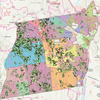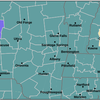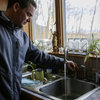Confounding counterfeiters
ALBANY COUNTY More fake bills are being passed in Albany County stores than ever before.
“Once it’s been passed to a retailer and is in the cash drawer, it’s useless. It’s theft,” said Ted Potrikus, the vice president of the Retail Council of New York State.
The Albany County District Attorney’s Office is working with the United States Secret Service and local business groups to stop counterfeiters.
There have been 20 arrests of counterfeiters in Albany County in the last year, according to Christopher Baynes, the bureau chief of the financial crimes unit for the Albany County District Attorney’s Office. “That’s more than in my whole career,” said Baynes, who has been on the job for 16 years.
Asked why, he said, “A lot of it is technology. Anyone with a color laser printer can make counterfeit bills.” He went on, “Most people we get are not the creators. They pay pennies on the dollar and pass it on.”
Asked about the redesign of United States currency in recent years to make the bills harder to counterfeit, Baynes said, “The new bills are better but are meant to foil sophisticated counterfeiters. We’re mostly dealing with people not getting super bills from overseas. We have busted people with a printer in their house.”
The Capital District is a magnet for counterfeit bills, Baynes said, because it is fed by both the Northway and Thruway and is close to major metropolitan centers.
“Someone can easily drive from New York City,” he said, “ and hit a couple of stores and go back.”
Looking at the rap sheets of those who have recently been arrested, Baynes said, shows some suspects have gone from selling drugs to passing counterfeit bills while other drug dealers are taking up counterfeiting as “a side business.”
He described a couple of ways that the counterfeiters launder their money. One is to use a big counterfeit bill to make a small purchase; the change is then legitimate money. Another is to buy a gift card at a chain store with a counterfeit bill and then travel to another location to use that certificate right away. The perpetrator leaves the store with goods before the counterfeit bill has been discovered.
Erika Gauthier, who is in charge of programs and membership for the Guilderland Chamber of Commerce, which along with the Albany-Colonie, Colonie and Bethlehem chambers is involved in the partnership to stop counterfeiters, said that those passing the fake bills will often “look for busy places where there’s a kid working the register with 10 people in line; they don’t really look at the bill,” she said of the busy young cashiers.
Potrikus said that many merchants have special pens they use to swipe bills to see if they are counterfeit.
“The pens are not foolproof,” Baynes told The Enterprise. “They’re not bad to use, but we don’t want to rely on them.”
He explained that the markers react to paper pulp, indicating a counterfeit bill. But, he went on, counterfeiters will coat their bills with hairspray, so that the marker doesn’t pick up the pulp underneath.
“The Secret Service prefers infrared light,” he said of detecting counterfeits.
Baynes said that, without special equipment, the best way to tell if a bill is real is to feel it. “It should feel more like cloth than paper,” he said. “That’s why bills don’t fall apart in the washing machine.”
Potrikus, whose organization, he said, has 5,000 member stores, “ranging from mom-and-pops to the biggest retailers in the world,” reported that, in recent years, both shoplifting and counterfeiting have been on the rise across the state.
“It’s a huge, huge problem for retailers,” he said. He praised Albany County’s David Soares. “The D.A. has taken organized retail crime seriously and is getting to the deeper root of it,” he said.
Baynes said that a course will be taught at the end of August so that retailers can learn how to protect themselves from counterfeiters. They will be taught how to spot both counterfeit money and counterfeit credit cards.
Soares is holding a press conference this morning, July 29, at Crossgates Mall to announce the partnership with local businesses to battle counterfeit money flowing into the Capital Region.
Joe Castaldo, the general manager of Crossgates, said yesterday that he wasn’t aware of any increase in counterfeit bills at the mall, adding, “That doesn’t mean it doesn’t happen.”
He said he heard Soares speak about the problem at a chamber breakfast and “thought it would be a good idea to form a consortium.”
“We want to be pro-active,” said Castaldo.


